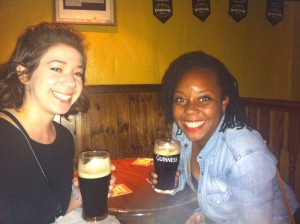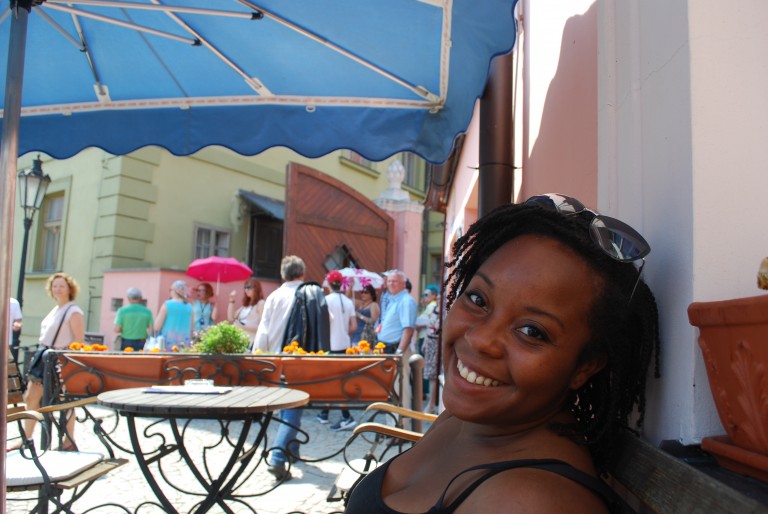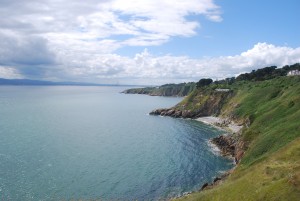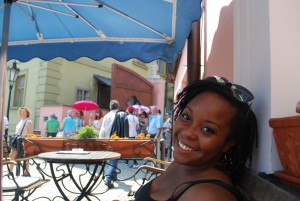Traveling While Black Part One: Why More Black People Need to Travel
Although my immediate family has gotten used to my wanderlust, when I talk about my overseas travel with other relatives, I tend to get one of three responses. The first, and the most welcome, is admiration. It comes with questions and demands for pictures and a detailed account of my adventure. In general, they seem very proud of me for taking on the world by myself.
The second response tends to be skepticism or disbelief. They can’t believe I went. They think there must’ve been some sort of catch. They ask questions too, but these are almost accusatory, as if overseas travel by someone like me is something they just can’t wrap their head around.
But the last look is one of disapproval. This is usually accompanied with the comment “I can’t believe you went there,” and said with raised eyebrows, pursed lips and a look you might give someone who claims they successfully wrestled an alligator: you got lucky the first time, but you’d be better to not do it again.
Underlying this third response is the idea that I was not supposed to go and the reasons for this are obvious: I am a young woman who stands at 4 feet, ten inches. And I’m black.
To be fair, the looks I get when discussing my traveling while black adventures are about as varied as the articles that talk about why black people do or do not travel, should or shouldn’t travel and where they should or should not go. Among all of the dissenting opinions, one thing remains constant: we just don’t hear enough about black travel.
Is it happening? Of course it is. I know black people who have traveled to Japan, New Zealand, Austria, Turkey, Morocco, France and Uganda. All you have to do is google traveling while black and you’ll be flooded with websites and travel blogs and communities full of black women and men who make traveling a priority. And yet many other black people, not just my family members, insist that black travel, on an international level, is dangerous and something we don’t do.
I don’t buy it.
As a black person who has traveled overseas, I believe travel is absolutely necessary. We need to normalize it; we need to break stereotypes associated with our culture and our travel habits; we need to see a world that isn’t so burdened with the history that America has with its black folk; we need to learn about other cultures firsthand and grow because of it. Travel is essential for all Americans, especially those hesitant to venture outside the country’s comfy borders. But for black people, it’s essential for different reasons. Traveling as an African American is an experience unlike traveling as just an American, and I believe that the more we travel, the more we get a chance to define what traveling black really means.
Representation
We need to take an active role in increasing representation. Growing up, I didn’t see myself or others like me in the media, in popular books, or in much of my everyday life (growing up in the suburbs will do that to you). But now, I find myself cycling through books written by or featuring people of color, watching TV catered to us and our experiences and making sure I write the same because representation is so important in helping to form our identities. So naturally, I believe intentional representation should extend to traveling.
I would have loved to see many more black people on my European trip. It was such a strange feeling, knowing that I could go days without seeing anyone who looked like me. And if I was feeling this strange about it, I had to wonder how the people around me felt.
We need to be seen. We need to show other cultures that African Americans do travel, so that people who have never seen a black person in the flesh aren’t confused and blown away by our coexistence. Because if we aren’t regularly seen in places like Croatia, China or Bulgaria, then how are people going to know how to treat us when we go?

Once we begin to normalize ourselves to the locals of different countries, then we open up greater avenues of exchange and respect and decrease the gawking, stares and comments that remind of us our otherness.
We need to do this for us, and we need to do this for them. Because if anything, increasing our presence in countries and getting other cultures used to us just might save some of us from the inevitable hair touching/grabbing/patting we’re bound to experience at least some point in our travels. And bringing that to an end would be worth traveling to the ends of the Earth.
Stereotypes
Black people are not portrayed in a positive light in American media. If all you knew about black people was what you had seen on the TV, you would probably have skewed views and assume that we are all really good at sports, addicted to drama of the Flavor of Love kind, love to twerk, sing and have bad attitudes. We’re all familiar with these stereotypes.
Obviously, they’re just that: stereotypes. But we have to realize that other people might not come to this realization so readily. It’s easy to think something of a person or group of people for so long that even when you come to evidence that points against your beliefs, you can’t quite wrap your head around it.
And that is exactly why these stereotypes are so damaging because they limit others’ abilities to really see us and limit our own ability to see ourselves and what we are capable of. Why is it that some black people assume that travel is something we just don’t do? It’s because it’s a stereotype many of us have chosen to believe.
It’s important that we write our own stories and show that the media does not have the final say on who we are and what we are capable of. It’s important that we don’t let these limitations that the media has placed on us and that we have placed on ourselves as a result dictate our actions and our desires. We need to travel to break these stereotypes.
The World Beyond America
America is dark. We hear daily about cops shooting down our men, see our women’s bodies mocked, our culture appropriated and are hard pressed to get away from the public’s disregard for our lives. There are movements. Activists do so much to fight back and to change this. But it’s all still enough to weigh us down. It’s enough to make you forget that our American history is not the history of the world.
I remember when I was in Dublin, exploring one of the many museums and suddenly it hit me: the history of Ireland is completely different than the history of America. The history classes their children attend are not the same as mine were. And of course I had known that all along in the back of my mind, but it wasn’t until then that I felt like I really absorbed that fact. It was a moment of undoing for me, realizing that there are so many different histories out there, not just mine. I felt almost dizzy with relief.
When black people travel abroad, we are physically leaving a place that is marked with the blood of our ancestors, physically breaking ties with a past of slavery, rights that we’re still fighting hard for today. America’s relationship with its black people is one of hypocrisy, disillusionment and distrust. I’ve felt so many times the desire to leave and to just release myself from the negativity of it all. Traveling gives us that ability.
I’m not saying that there won’t be racism. Again, the media is a powerful component of our lives and western media has an enormous influence over the rest of the world. Some amount of discrimination will likely surface, and some places just may be a reminder of the prejudice we wanted to leave behind.
But there’s something deeply symbolic about leaving your home and going to a place where you don’t quite fit into its history. For some, it could be unnerving. I find it tastes a little like freedom.
Growth
I distinctly remember being alone in the Dublin airport, waiting to board my flight to Prague and begin my first solo adventure and being so terrified I feared I was on the verge of a panic attack. I must have looked it too because it led a sweet, elderly Irish woman to strike up a conversation with me to offer me some comfort and encouragement. We must have talked for at least half an hour, but I barely remember a word exchanged. To be honest, it’s only in hindsight that I remember that the conversation happened at all because at the time my terror blocked out most coherent thoughts.
And you know what? Turns out the fear was for nothing.
My solo adventure went pretty much the way all the other solo female travelers told me it would go – perfectly fine. I learned to travel by myself, I learned how to make my own plans, look out for myself, how to be alone, and how to just be, all in another country. I met people I will never forget, had experiences that changed me and my perception of the world. I did a lot more growing in that month than I have in more time. I’m much happier with the person I am now that I’ve gone.
I can’t speak specifically to how travel will change any individual, but I can say that it will, and I don’t think you’ll regret it.
There are so many reasons more black people need to travel, but at the end of the day a desire to learn and to grow as a person and a citizen of the world is one of the most pressing. Travel because you want to. Travel because the experience you’ll have is one unlike any other. Travel in spite of opinions or stereotypes. Traveling while black will certainly bring about its own set of challenges, but experience them, embrace them and grow.




